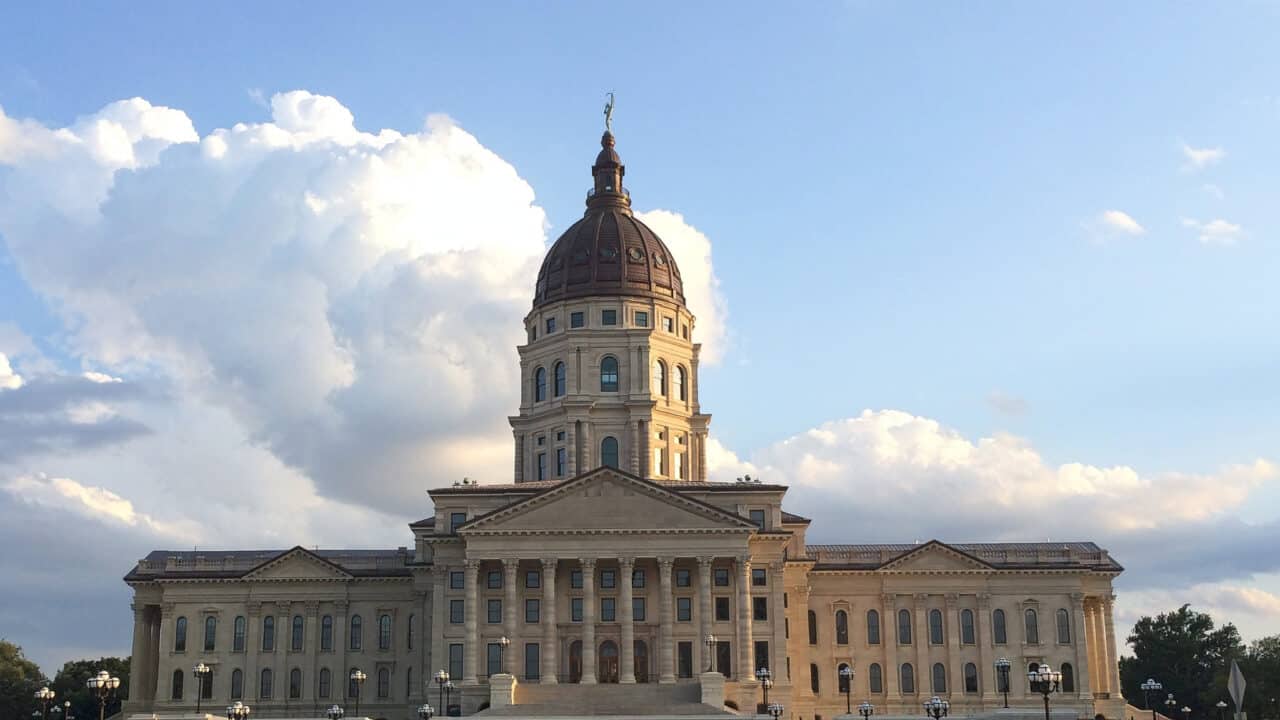 Kansas State Capitol by Ben Smith is licensed under Attribution-NonCommercial (CC BY-NC 2.0)
Kansas State Capitol by Ben Smith is licensed under Attribution-NonCommercial (CC BY-NC 2.0)
Last year, Kansas families were on the verge of seeing $1.4 billion in income, retirement, and property tax relief after several sweeping tax cut packages passed the House and Senate with overwhelming support.
However, Governor Laura Kelly (D) dashed their hopes by indifferently vetoing those tax relief packages. Instead of returning surplus funds to the pockets of hardworking families and small businesses who earned them, Kelly chose to stash away billions in taxpayer dollars into state government coffers.
Now, it appears that Gov. Kelly is having second thoughts.
Soon after the start of session, the governor announced three provisions – cherry-picked from the very same tax bill she vetoed last year – and offered them up as her own plan for tax relief.
Kelly was joined onstage by the Democrat Senate Minority Leader and three other senators who, despite their self-proclaimed conservative approach to governance, voted with all Democrats to kill last year’s tax cut package. Republican Senator John Doll voted against the bill at every opportunity. Senator Rob Olson, also a Republican, voted for the bill on the floor and on the first motion to override Kelly’s veto, but flipped on the second attempt. And Senator Dennis Pyle, a longtime Republican who became an independent to run as a third-party candidate for Kansas governor in 2022 as “the only true conservative in the race”, supported the bill on three occasions during session until he ultimately voted to uphold the veto.
The combined efforts of Governor Kelly and Sens. Olson, Doll, and Pyle withheld major tax relief for Kansans last year. Gov. Kelly’s “newly” proposed tax reform must be evaluated in light of that reality.
The proposed reforms include:
- Raise the property tax exemption from $75,000 to $100,000.
- Increase the standard income tax from $3,500 to $5,000 ($8,000 to $10,000 for joint filers), while leaving in place a progressive tax structure with a high 5.7% top rate.
- Eliminate taxes on Social Security income.
Pursuing just these three components leaves out what is by far the most important piece of that failed legislation: moving to a lower, single-rate tax.
Moreover, the Kansas legislature is preparing for a vote on a new tax package that would include all three of the Governor’s proposals, as well as income tax rate reductions, just like last year’s vetoed SB 169.
The new tax bill to be voted on this Thursday offers a single-rate tax at a rate of 5.25%. That is much lower than the current top rate of 5.7%, which kicks in at just $30,000 in income.
It also nearly doubles the standard deduction by a cost-of-living adjustment, exempting $6,150 from income taxes entirely. That’s a higher deduction than Kelly’s proposed level of $5,000. On top of that, non-exempt income would now be subject to a lower rate, providing more savings to most Kansas taxpayers. And it offers far more in terms of total dollar relief.
Abandoning the single-rate tax component constitutes a crucial mistake. Kelly’s arguments ignore the fact that Kansans are subject to one of the highest income tax rates in the region. Nebraska sits a bit higher at 5.85%, but is scheduled to phase down its income tax rate to 3.99% by 2027. Missouri cut its income tax rate to 4.5% last year. A constitutional amendment in Colorado, known as the Taxpayer Bill of Rights (TABOR), forces income permanent tax cuts when state revenue exceeds the rate of population growth plus inflation, which reduced their rate to 4.4% last year. Oklahoma’s rate is below 5%, with discussions to go even lower. And Texas, of course, levies no income tax at all. Countless new families and businesses are migrating from high-tax states like California and New York in favor of fewer tax burdens.
Governor Kelly has incorrectly argued that a single-rate tax would only benefit those making more than $250,000 a year and would make the state’s tax system regressive. She fails to consider that every Kansas taxpayer would see an immediate and ongoing reduction in their income tax bill, while ensuring that taxes paid are proportional to earned income – a stable and fair method of taxation designed to stimulate prosperity.
Flat taxes also tend to reduce tax code manipulation and close loopholes, solving the distortions inherent in Kelly’s preferred “three-legged stool” approach. Additionally, a single-rate tax would help drive the state’s competitiveness by stimulating economic growth through greater in-migration and increased capital investment. Crucially, small businesses file income taxes on the personal side of the code, making this a big win for families and businesses alike.
Passing with overwhelming support in the Senate last night, and with over $4 billion sitting untouched in government coffers, Governor Kelly and Kansan Representatives would do well to follow suit and quickly approve House Bill 2284.

